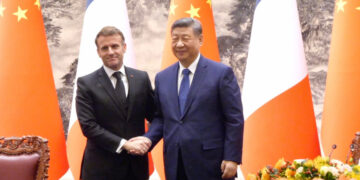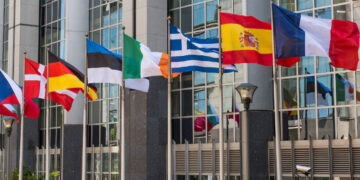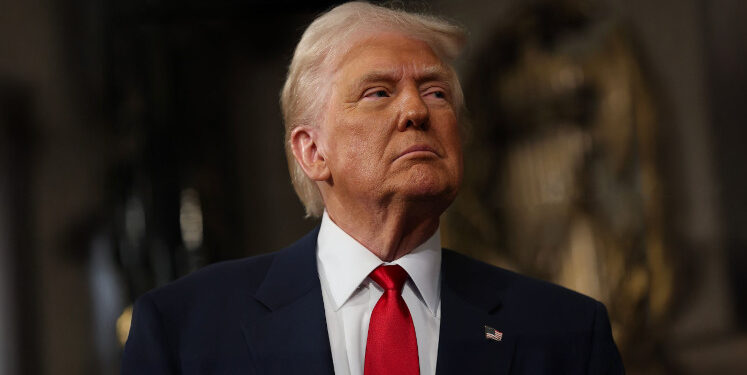Donald Trump’s appeal is built on a blend of border control, neoliberalism and mercantilism, writes Giray Gozgor. Yet while this mix might seem uniquely American, there are signs of the Trump model gaining ground in Europe.
Donald Trump’s political brand has evolved into a striking combination: strict immigration controls at home, neoliberal economics domestically and mercantilist trade abroad. At first glance, this mix looks contradictory. However, as a political narrative, it offers clarity: “security through exclusion, prosperity through deregulation and pride through economic confrontation”.
While this may sound uniquely American, the package can resonate strongly in Europe. Across France, Germany and Italy, in particular, debates on migration, market liberalisation and economic sovereignty are already prominent. When economic uncertainty rises, these issues take on a sharper edge, and recent research shows why that matters.
Economic uncertainty and populist politics
In a recent study that uses data from 24 EU countries, I have demonstrated that higher economic uncertainty is associated with increased support for populist parties, particularly on the right. Using the World Uncertainty Indices, my analysis revealed that when citizens perceive conditions as unpredictable, they tend to gravitate towards clear, bold alternatives, even when those alternatives are based on contradictions.
This finding is also crucial for understanding the Trump formula. During periods of turbulence, voters are often not looking for complex solutions. Instead, they want stories to explain the world. Trump’s three-part strategy aligns perfectly with that demand.
The three strands of Trumpism
Immigration is the most visible part of the formula. By promising to secure borders, Trump signals control in uncertain times. This is less about economic calculation and more about providing psychological reassurance.
Europe has seen similar dynamics. Marine Le Pen in France, the AfD in Germany and Giorgia Meloni in Italy all tie immigration restrictions to national stability. When energy prices soar, inflation bites or security fears rise, calls for stricter borders become even more politically attractive.
The second element is neoliberal economics, characterised by deregulation, tax cuts and fewer regulations for businesses. On the surface, this seems to contradict an anti-immigration stance. In practice, however, it allows for coalition building, as elites and businesses welcome fewer constraints.
Additionally, middle-class aspirants are reassured that more freedom for markets will generate new opportunities. The combined message is simple: “You will be protected from external competition and liberated at home to prosper”. Under uncertainty, that promise has wide appeal.
The third component flips the domestic logic. In trade, Trump promotes tariffs, protection and zero-sum thinking. This is less about textbook economics than political theatre since it provides an external scapegoat and frames confrontation as a patriotic duty.
Here again, Europe is familiar. The concepts of “strategic autonomy” and “economic sovereignty” have gained traction in many EU countries. Framing globalisation as a threat to be managed, or an enemy to be resisted, becomes politically potent when uncertainty rises.
Hidden risks
However, the political clarity of this package conceals serious economic dangers. First, restricting immigration in ageing societies worsens labour shortages. Second, deregulation tends to deepen inequality, fuelling the very discontent populists thrive on.
Third, trade retaliation threatens Europe’s export-oriented economies, particularly Germany. What looks neat as a narrative may therefore create greater instability in practice, potentially feeding a cycle of uncertainty and populist politics.
France, Germany and Italy are particularly vulnerable. They each have a degree of “narrative readiness”, since immigration, deregulation and sovereignty are already part of the mainstream debate. Populist infrastructure also already exists in these countries and established parties can easily adopt the formula.
Finally, they each have structural vulnerabilities, such as ageing populations, labour shortages and exposure to global shocks. When uncertainty spikes, as it has with the Russia-Ukraine war, these conditions will make the Trump approach more attractive.
What should European policymakers do?
Countering this dynamic requires more than fact-checking populist claims. It requires reducing uncertainty and providing alternative narratives that are equally clear and concise.
Reducing uncertainty is important. Policymakers should strengthen social safety nets, unemployment insurance and transparent economic governance. They should avoid technocratic vagueness and offer visions of fair globalisation and inclusive growth.
Policymakers should also reshape globalisation by investing in strategic sectors, deploying carbon border taxes and setting rules that work for Europe. Safeguarding institutions is crucial. It is essential to maintain the strength of courts, regulators and civil society to mitigate the long-term consequences of populist surges. And politicians in mainstream parties should show how inclusive policies can deliver both growth and security, appealing to hearts as well as heads.
Trump’s mix of border control, neoliberalism and mercantilism is more than an American curiosity. It is a political formula designed for uncertain times, and such times are precisely when voters embrace populist solutions.
For Europe, the danger is clear. Economic turbulence can make Trump-style politics increasingly attractive. The challenge for policymakers is to address uncertainty at its roots and articulate compelling alternatives before the narrative of exclusion and confrontation takes deeper hold.
For more information, see the author’s recent study in Public Choice.
Note: This article gives the views of the author, not the position of EUROPP – European Politics and Policy or the London School of Economics. Featured image credit: Brian Jason / Shutterstock.com






































Discussion about this post